- Home
- Howard Jacobson
Kalooki Nights
Kalooki Nights Read online
Praise for Kalooki Nights
“Jacobson’s prose is pure pleasure—concise, markedly insightful, sometimes laugh-out-loud funny—and his message, ultimately, is a heartbreaker. An exceptional novel.”—Booklist
“A brilliant, raucous, ribald romp through the world of contemporary Britain, as seen by a dyspeptic, thrice-married Jewish cartoonist. Not many novelists can induce me to laugh out loud. Jacobson can.”—The Globe and Mail
“How is one to convey news of the arrival of a work of genius? This powerful, troubling, moving, profound novel is nothing less. Its architecture—more accurately: its engineering, the construction of it—is a feat of brilliance. [Yet] what really steals one ‘s breath away is its sharpness and depth of insight—a sharpness that flays, and a depth almost too vertiginous to describe. It is the most intelligent and important novel to appear in this country in years … It is, to repeat and to repeat plainly, a work of genius.”—The Times
“Kalooki Nights is a disturbingly comic airing of what Max’s family would consider the Jews’ dirty laundry … Jacobson tests the limits of good taste every bit as energetically as Max does. It moves almost effortlessly from crude humour to dead seriousness … Kalooki Nights … begs to be read.” —Winnipeg Free Press
“In Kalooki Nights [Jacobson] has taken his skills to a new level and produced a novel of genius. To do critical justice to it would require a review many times longer than the work itself … Behind the dust-sheets Jacobson is presiding, with absolute authority and control, over the construction of a masterpiece.” —The Independent
“The raging, contentious, hilarious, holy, deicidal, heartbreaking Kalooki Nights is a novel that stands toe-to-toe with the greats. A brilliant and combative humour is at the heart of this extraordinarily audacious look at Jewishness … The reader—entertained, exhausted and ennobled—will finish this colossal work of art in remembrance and sorrow.”—The Sunday Telegraph
“This is turbo-charged; someone has put a rocket under Jacobson, and the result is scintillating … Jacobson is quite simply a master of comic precision. He writes like a dream, with complete mastery of technique … The book isn’t really just about being Jewish at all. It’s about being human.”—Evening Standard
“Howard Jacobson is incapable of writing a predictable sentence. It is likely to be the funniest book published this year … [His] prose [is] sharper and brighter than any of his contemporaries.”—The Observer
“A masterpiece … a brilliantly constructed, playful, evocative, hilarious, midnight dark novel.”—Sunday Herald
“A welcome return to the bittersweet Yiddish-inspired humour at which Jacobson excels … a gloriously pugnacious novel.”—The Guardian
“Howard Jacobson’s tour de force … You don’t have to be Jewish to love this book, just human.”—The Guardian (London and Manchester)
“A ferocious intelligence courses through it, reminiscent of Philip Roth at his … best.”—Jewish Chronicle
“The most brilliantly ambitious (and ambitiously brilliant) of his eight novels … If this one does not make a shortlist or two, it will be a cruel joke indeed.” —New Statesman
“Not many novelists would dare to tackle such a difficult subject at any point in their career. Kalooki Nights marks Jacobson out as one of the few writers who have been brave enough to try—and as one of the even fewer number who have done so successfully.”—The North West Enquirer
“A scorching disquisition on (British) Jewish identity, spun from an unspeakable criminal act … Jacobson’s account of a life of ‘jokes, Jews, bitterness, and whys’ is clever, celebratory, condemnatory, excessive, overwhelming and unique.” —Kirkus Reviews
“Rich, colorful characters.”—Entertainment Weekly
PENGUIN CANADA
KALOOKI NIGHTS
HOWARD JACOBSON lives in London and is the author of ten novels and four works of non-fiction. Kalooki Nights was longlisted for the Man Booker prize. Jacobson won the Everyman Wodehouse Award for comic writing in 1999 for The Mighty Walzer. The Act of Love is his most recent work.
ALSO BY HOWARD JACOBSON
Fiction
Coming from Behind
Peeping Tom
Redback
The Very Model of a Man
No More Mister Nice Guy
The Mighty Walzer
Who’s Sorry Now?
The Making of Henry
The Act of Love
Non-fiction
Shakespeare’s Magnanimity (with Wilbur Sanders)
In the Land of Oz
Roots Schmoots
Seriously Funny: An Argument for Comedy
PENGUIN CANADA
Published by the Penguin Group
Penguin Group (Canada), 90 Eglinton Avenue East, Suite 700, Toronto, Ontario, Canada M4P 2Y3
(a division of Pearson Canada Inc.)
Penguin Group (USA) Inc., 375 Hudson Street, New York, New York 10014, U.S.A.
Penguin Books Ltd, 80 Strand, London WC2R 0RL, England
Penguin Ireland, 25 St Stephen’s Green, Dublin 2, Ireland (a division of Penguin Books Ltd)
Penguin Group (Australia), 250 Camberwell Road, Camberwell, Victoria 3124, Australia
(a division of Pearson Australia Group Pty Ltd)
Penguin Books India Pvt Ltd, 11 Community Centre, Panchsheel Park, New Delhi – 110 017, India
Penguin Group (NZ), 67 Apollo Drive, Rosedale, North Shore 0745, Auckland, New Zealand
(a division of Pearson New Zealand Ltd)
Penguin Books (South Africa) (Pty) Ltd, 24 Sturdee Avenue, Rosebank,
Johannesburg 2196, South Africa
Penguin Books Ltd, Registered Offices: 80 Strand, London WC2R 0RL, England
First published in Great Britain by Jonathan Cape, an imprint of Random House,
20 Vauxhall Bridge Road, London SW1V 2SA, 2006
Published in Canada by Penguin Group (Canada),
a division of Pearson Canada Inc., 2007
published in this edition, 2009
1 2 3 4 5 6 7 8 9 10 (WEB)
Copyright © Howard Jacobson, 2006
All rights reserved. Without limiting the rights under copyright reserved above, no part of this publication may be reproduced, stored in or introduced into a retrieval system, or transmitted in any form or by any means (electronic, mechanical, photocopying, recording or otherwise), without the prior written permission of both the copyright owner and the above publisher of this book.
Publisher’s note: This book is a work of fiction. Names, characters, places and incidents either are the product of the author’s imagination or are used fictitiously, and any resemblance to actual persons living or dead, events, or locales is entirely coincidental.
Manufactured in Canada.
ISBN: 978-0-14-317089-1
Library and Archives Canada Cataloguing in Publication data available upon request to the publisher. British Library Cataloguing in Publication data available.
Except in the United States of America, this book is sold subject to the condition that it shall not, by way of trade or otherwise, be lent, re-sold, hired out, or otherwise circulated without the publisher’s prior consent in any form of binding or cover other than that in which it is published and without a similar condition including this condition being imposed on the subsequent purchaser.
Visit the Penguin Group (Canada) website at www.penguin.ca
Special and corporate bulk purchase rates available; please see
www.penguin.ca/corporatesales or call 1-800-810-3104, ext. 477 or 474
To Ian MacKillop
1939 – 2004
Incomparable Teacher and Friend
I knew a fellow named Otto Kahn, who was a very rich man, and he gave a lot of mone
y to the Metropolitan Opera House at one time. His close friend was Marshall P. Wilder, who was a hunchback. And they were walking down Fifth Avenue, and they came to a synagogue, and Kahn turned to Wilder and said, ‘You know I used to be a Jew.’ ‘Really?’ said Wilder. ‘I used to be a hunchback.’
Groucho Marx
a cognizant original release september 24 2010
BOOK ONE
FIVE THOUSAND YEARS OF BITTERNESS
ONE
Instead of the cross, the Albatross
About my neck was hung.
Coleridge, ‘The Rime of the Ancient Mariner’
1
Once when no one was buying my cartoons I took a job ripping off the Tom of Finland books for an unscrupulous pirate publisher of gay eroticism. Deltoidal, no-necked, peach-bottomed sadists and cock-suckers wearing leather caps and curiously benign expressions, romping in a spunky never-never sodomitic kindergarten unimpeded by the needs or interdictions of wives and mothers. For a straight man who couldn’t see what Tom of Finland had to offer, other than the clean lines of the illustrations and the absence, beyond twenty-four-hour on-tap buggery and fellatio, of any supererogatory fantasy or fuss, I reckon I made a reasonable fist of copying his creations. It was good for me too, I thought, inhabiting this alien demi-Eden for a while. It relieved some of the stress I was under. The stress of a failed marriage and a failing career – the usual – but also the stress of coming from an ethno-religious minority, or whatever you call us, whose genius doesn’t extend to irresponsible recreation. Jews don’t do Paradise Regained. Once you’re out you’re out with my people. The gates swing shut behind you, the cherubim flash their flaming swords, and that’s that. This is what it means to be Old Testament. You’re always conscious of having blown your chance of a good time. Now here I was enjoying a proxy frolic in the Garden again.
Where I messed up professionally was in the straining bulge all Tom of Finland’s characters carried in their trousers. To begin with I failed to notice there was a bulge there at all. But even when the bulge was brought to my attention I couldn’t copy it with conviction. I couldn’t capture the anticipatory strain. Couldn’t render the explosive tension between the glans penis and the denim. In the end I had to admit that this was because I had never worn denim or leather myself, and didn’t understand the physics of the pressure from the inside. Jewish men wear loose, comfortable trousers with a double pleat. And maybe, in chilly weather, a cardigan on top. It is considered inappropriate by Jews to show strangers of either sex the outline of your glans penis.
No commandment against it that I know of. Just not what you do.
And for this, as an uncle of mine used to say, apropos anything Jewish, the Nazis tried to exterminate us.
My father’s response, if he happened to be around, reminded me of someone swatting a fly. ‘Since when did any Nazi try to exterminate you, Ike? You personally? Had I thought the Nazis were after you I’d have told them where to find you years ago.’
Upon which my uncle, who had lived with us for as long as I could remember, would turn white, accuse my father of being no
better than Hitler himself, and flee to his room to hide.
Were they playing? Did they go on repeating this exchange because they thought it was amusing? Hard to decide when you’re small whether people twice your size are joking or not. Sometimes everything they do looks like one big joke. But Hitler didn’t sound a funny name. And ‘exterminate’, as I discovered from the little dictionary which my mother kept in her display cabinet, as though it were as precious as her china or my father’s boxing cups, meant to destroy utterly, to put an end to (persons or animals), to drive out, to put to flight, to get rid of (species, races, populations, opinions). From which I inferred that no, my father and my uncle could not have been playing, but must have intended their jousting as a sort of magic, to ward off evil. To keep us from being driven out, got rid of, and the rest of it.
Thus did I grow up in Crumpsall Park in the 1950s, somewhere between the ghettos and the greenery of North Manchester, with ‘extermination’ in my vocabulary and the Nazis in my living room.
So when Manny Washinsky swapped me his copy of Lord Russell of Liverpool’s The Scourge of the Swastika: A Short History of Nazi War Crimes for a bundle of comics, I was already softened up, though I couldn’t have been much more than eleven at the time, to receive its contents. ‘The murder by Germans of over five million European Jews,’ Lord Russell of Liverpool wrote, ‘constitutes the greatest crime in world history.’ A conclusion which electrified me, not because it was news exactly, but because I had never before seen it written down. Over five million! So that was what being put an end to meant! The figures conferred a solemn destiny upon me. For it is not nothing to be one of the victims of the greatest crime in world history.
By any of the usual definitions of the word victim, of course, I wasn’t one. I had been born safely, at a lucky time and in an unthreatening part of the world, to parents who loved and protected me. I was a child of peace and refuge. Manny too. But there was no refuge from the dead. For just as sinners pass on their accountability to generations not yet born, so do the sinned against. ‘Remember me,’ says Hamlet’s father’s ghost, and that’s Hamlet fucked.
Manny wasn’t the only boy in the street who knew The Scourge of the Swastika. Errol Tobias, a year or two older than us, was also a reader. Not that we were any sort of study group or book club. Because I felt ashamed of being Manny’s friend when I was with Errol, and ashamed of being Errol’s friend when I was with Manny, I was careful not to bring them together or otherwise to intimate our shared experience. Left to their own devices, neither existed for the other. Manny too devout, Errol too profane. They weren’t simply chalk and cheese, they were the devil and the deep blue sea. Not a fanciful comparison: in Manny there were unfathomable depths, in Errol a diabolism that was frightening to be near. When he went into one of his lewd playground rages, Errol’s eyes boiled in his head like volcanoes; you could smell his anger, like a serpent turning on a spit; a translucency upon his skin, as though God were trying to see through him. Yet it wasn’t the devilish one of the two who ultimately did the devilish thing. Unfair, but there you are. It would seem that it isn’t necessarily your nature that determines your fate. Incidentals such as spending too much time listening to your fathers’ fathers’ ghosts can do it just as well. But in that case all three of us should have grown up to be murderers, not just Manny Washinsky.
As for Jews not showing strangers the outline of their glans penis, Errol Tobias was either a changeling or the exception that proved the rule. A genitally besotted boy, he grew into a genitally besotted man. Manny and I were more in character. For which demureness I have not the slightest doubt that the Nazis – to borrow my uncle’s favourite locution – would have tried to exterminate us. As a cartoonist I am given to travesty and overstatement, but this is not an example of either. There are serious causal connections to be traced between the Jew’s relation to his body – modesty, purity, the dread solemnity of the circumcision covenant – and the Jew-baiting practised by the Germans. For reasons that will bear deep scrutiny, the world hates and fears a man who makes a palaver of his private parts. I think that’s the issue: not the foreskin, the palaver. Whenever anti-Semitism is mobilised from an itch into a movement it takes flight into some ideal Sparta – a Finlandia of square-jawed analisers skylarking in the gymnasia or the baths, at ease with both their own and others’ genitalia. And what is that but nostalgia for a time before the Jews imposed seriousness upon the body?
No going back into the Garden, we say. And no return to nature. Life – now that we have been expelled from Paradise -life, as an activity of the mind and not the sexual organs, begins in earnest.
For which devotion to intellect and conscience they cannot forgive us.
That was that as far as Tom of Finland went, explain it how you like. Max of Muswell Hill in accommodating flannel pants looked a nice enough guy but he wasn
’t going to make a killing in the sex shops of Soho.
It wouldn’t surprise me to learn I was the first and last Jew – the first and last English Jew, at any rate – to be employed in the homoerotic copycat business.
Jew, Jew, Jew. Why, why, why, as my father asked until the asking killed him, does everything always have to come back to Jew, Jew, Jew?
2
He was a boxer whose nose bled easily, an atheist who railed at God, and a communist who liked to buy his wife expensive shoes. In appearance he resembled Einstein without the hair. He had that globe-eyed, hangdog, otherwise preoccupied Jewish look. Einstein, presumably, is thinking E = mc2 when he stares into the camera. My father was thinking up ways to make Jewishness less of a burden to the Jews. J ÷ J = j.
Had he seen me with my head buried in The Scourge of the Swastika he’d have confiscated it without pausing to find out whether it was mine or someone else’s. Let the dead bury the dead, was his position. The way to show them the reverence they were owed was to live the life that they had not.
‘When I die,’ he said, unaware how soon that was going to be, ‘I expect you to embrace life with both hands. Then I’ll know I’ve perished in a good cause.’
‘When you’re dead you won’t know anything,’ I cheeked him.
‘Exactly. And neither do the dead of Belsen.’
This wasn’t callousness. Quite the opposite. It was our deliverance he sought – from morbid superstition, from the hellish malarial swamp shtetls of Eastern Europe which some of us still mentally inhabited, and from the death-in-life grip those slaughtered five or more million had on our imaginations.
He didn’t live to see me sell my first cartoon, which was probably a blessing. It showed Gamal Abdel Nasser and other Arab leaders looking out over an annihilated Israel on the eve of what would become known as the Six Day War. ‘Some of our best friends were Jewish,’ they are saying.

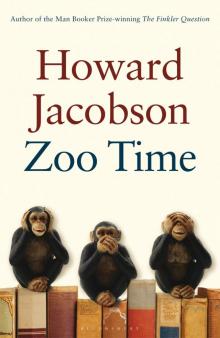 Zoo Time
Zoo Time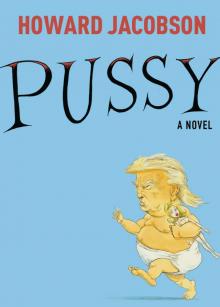 Pussy
Pussy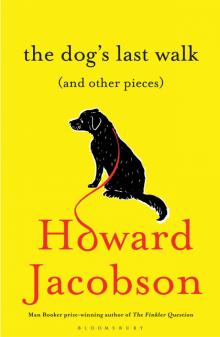 The Dog's Last Walk
The Dog's Last Walk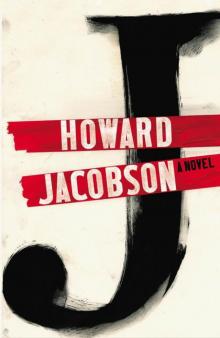 J
J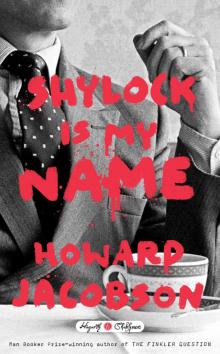 Shylock Is My Name
Shylock Is My Name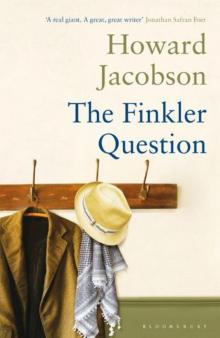 The Finkler Question
The Finkler Question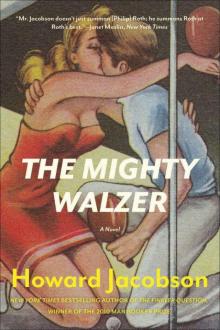 The Mighty Walzer
The Mighty Walzer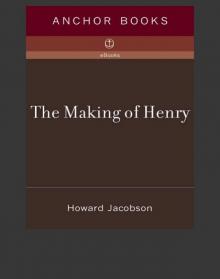 The Making of Henry
The Making of Henry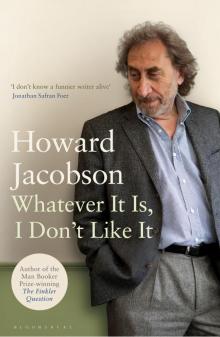 Whatever it is, I Don't Like it
Whatever it is, I Don't Like it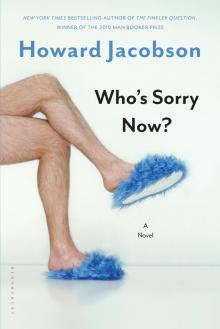 Who's Sorry Now?
Who's Sorry Now? Kalooki Nights
Kalooki Nights